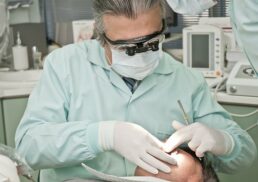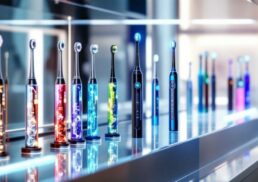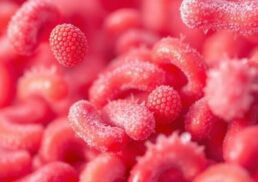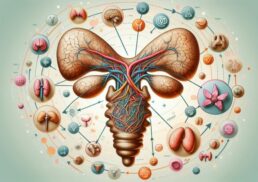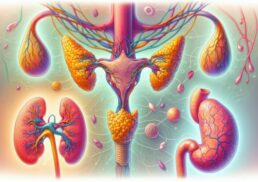Did you know that nicotinamide, a form of vitamin B3, offers a wide range of health benefits beyond just being a dietary supplement? In this blog post, we’ll delve into the fascinating world of nicotinamide, exploring its many health benefits including skin health, cellular processes, and even skin cancer prevention. We’ll also discuss the safety and side effects of this remarkable compound. So, let’s begin our journey into the world of nicotinamide and uncover its potential to improve our health and well-being.
Table of Contents
Key Takeaways
Nicotinamide is a water-soluble form of vitamin B3 that has therapeutic benefits for various conditions.
It plays an important role in cellular processes, energy production and skin health.
Clinical trials have provided evidence of its safety and efficacy, yet dosage should be tailored to individual needs.
Understanding Nicotinamide
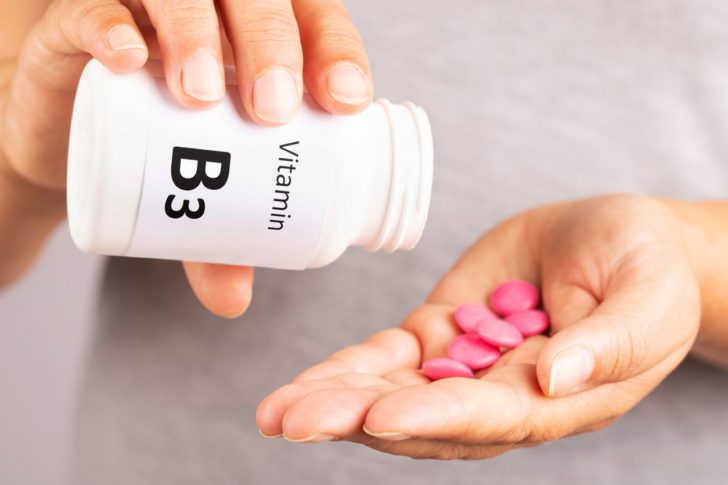
Nicotinamide, more commonly known as niacinamide, is a water-soluble variant of vitamin B3, responsible for several crucial body functions. Derived from an amino acid, it serves as a dietary source of nicotinamide adenine dinucleotide (NAD+), an essential coenzyme in energy metabolism pathways and cellular processes. Insufficiency of vitamin B3, which can also be caused by a lack of nicotinic acid, may lead to a severe ailment known as pellagra, characterized by dermatitis, diarrhea, and even dementia. This insufficiency is also referred to as niacin deficiency.
Over the years, researchers have discovered the therapeutic effectiveness of nicotinamide in treating various conditions, including inflammatory diseases and dementia, both in humans and animal models.
Origin and Sources
Nicotinamide naturally occurs in various food sources, such as:
fish
poultry
nuts
legumes
eggs
cereal grains
Discovered between 1935 and 1937, it is a form of vitamin B3 and is included on the World Health Organization’s List of Essential Medicines.
Extraction of nicotinamide from food sources for supplements involves acid, enzymatic, or acid/alkaline treatments, which aids in measuring nicotinamide levels through techniques like High-Performance Liquid Chromatography (HPLC). Some studies have even investigated the potential of nicotinamide for skin cancer chemoprevention.
Relationship to Niacin
Although nicotinamide is a form of niacin, it does not induce the flushing side effect typically associated with niacin supplementation. The chemical structure distinction between nicotinamide and niacin lies in the fact that nicotinamide has an amide group affixed to the pyridine ring, whereas niacin has a carboxylic acid group attached to the same ring.
Interestingly, both nicotinamide and niacin play a role in cellular processes and energy metabolism, as nicotinamide is converted into NAD+ through a salvage pathway, while niacin is converted into NAD.
Nicotinamide’s Role in Cellular Processes
Nicotinamide, being a precursor for NAD+ synthesis, helps in refilling cellular NAD+ levels, integral to numerous cellular activities. It modulates SIRT (sirtuin) activity through noncompetitive product inhibition mechanisms and regenerates NAD+ in salvage pathways.
Furthermore, it has been shown to inhibit SIRT1 in vitro.
NAD+ Metabolism
With its role as a precursor for NAD+ synthesis, nicotinamide holds an essential part in NAD+ metabolism, serving as an important coenzyme in an array of metabolic processes and energy metabolism pathways within cells. Nicotinamide replenishes cellular NAD+ levels through conversion into nicotinamide mononucleotide (NMN) by the enzyme nicotinamide phosphoribosyltransferase (NAMPT).
NMN is then further converted into NAD+ through a series of enzymatic reactions. The significance of NAD+ levels in cellular processes cannot be overstated, as NAD+ is a cofactor for enzymes involved in:
Cellular energy metabolism
DNA repair
Regulation of gene expression
Redox balance
Cell metabolism
Cellular Energy Production
Acting as a coenzyme for enzymes involved in cellular energy metabolism such as glycolysis, fatty acid oxidation, and the citric acid cycle, nicotinamide significantly contributes to the production of cellular energy. It is an essential component of nicotinamide adenine dinucleotide (NAD+), which is a key molecule in energy metabolism pathways.
NAD+ accepts and donates electrons, thereby facilitating the transfer of energy during cellular respiration and the generation of adenosine triphosphate (ATP), the primary energy currency of cells.
Skin Health Benefits

Ranging from acne treatment to rosacea management and providing anti-aging effects, topical nicotinamide extends numerous benefits for skin health. Sunscreens and cosmetic agents are among the applications that have been incorporating it. Its incorporation in these areas has been successful.
Acne Treatment
By reducing inflammation and controlling excessive sebum production, nicotinamide effectively treats acne. Its anti-inflammatory properties have been demonstrated in topical creams, gels, or oral supplements, all of which have shown significant decreases in acne.
The reduction in sebum production has been attributed to nicotinamide’s ability to decrease facial sebum production and diminish inflammation, inhibiting proinflammatory cytokine pathways.
Learn more, visit How to treat different types of acne.
Rosacea Management
Nicotinamide can enhance skin barrier function and minimize reactions to irritants, beneficial for individuals with rosacea. It achieves this by upregulating the production of ceramides and collagen, which helps maintain the skin barrier and prevent transepidermal water loss, ultimately improving facial skin appearance.
Furthermore, nicotinamide has been seen to possess anti-inflammatory properties and reduce sebum production.
Anti-Aging Effects
From fine lines and wrinkles to pigmentation, texture, and red blotchiness, nicotinamide can improve various symptoms of skin aging. Studies have demonstrated that nicotinamide can:
Impede inflammaging
Reduce adipose tissue
Modulate and control aging
Ameliorate age-related conditions
Replenish cellular NAD+ pool and mitochondrial energetics
Reduce oxidative stress and inflammatory response
Boost mitochondrial function
Improve cardiovascular function
These anti-aging benefits are attributed to nicotinamide’s role in cellular processes, as it helps maintain the NAD+ pool and supports mitochondrial function.
Skin Cancer Prevention
In recent years, there has been a growing interest in the potential role of nicotinamide in preventing skin cancer. Some clinical trials have shown that nicotinamide may reduce the number of new skin lesions in high-risk patients with actinic keratoses and squamous cell carcinomas.
These trials, conducted as double blind placebo controlled studies and published in n engl j med, suggest that nicotinamide may be an effective preventive measure for skin cancer. Further research, including a large-scale placebo controlled trial, is needed to confirm these findings.
Mechanisms of Action
By boosting DNA repair and preventing UV-induced immune suppression, nicotinamide might mitigate the risk of skin cancer. It affects cellular processes such as:
Functional repair mechanisms
Energy-dependent DNA repair
Regulation of specific kinases
Prevention of ATP depletion
Involvement in the base-excision repair pathway
Nicotinamide enhances repair of UV radiation-induced DNA damage in human melanocytes and keratinocytes.
Additionally, topical application of nicotinamide either before or after UV exposure has been found to be effective in preventing immunosuppression in ex vivo skin.
Clinical Trials and Evidence
The efficacy of nicotinamide in preventing skin cancer has been evaluated in various clinical trials. A study published in the New England Journal of Medicine found that oral nicotinamide was both safe and effective in reducing the rates of new nonmelanoma skin cancers and actinic keratoses.
Additionally, a phase II randomized controlled trial showed that oral nicotinamide reduced actinic keratoses. These trials provide evidence for the efficacy of nicotinamide in reducing skin lesions and its potential role in skin cancer prevention.
Other Health Benefits and Potential Uses
Apart from benefits for skin health and cellular processes, nicotinamide could enhance sleep quality, prevent beta cell destruction, and has potential as a treatment strategy against non-alcoholic fatty liver disease.
Sleep Enhancement
By enhancing REM sleep and diminishing awake time, nicotinamide could potentially improve sleep quality. Research has indicated that nicotinamide:
Reduces the time taken to fall asleep
Increases deep sleep
Results in improved sleep quality for middle-aged and older adults
Reduces drowsiness in adults over 65 years old
These findings suggest that nicotinamide may be a useful supplement for improving sleep quality in adults
Insulin Resistance Management
Recent research has shown an interest in the role of nicotinamide in managing insulin resistance. Studies have demonstrated that nicotinamide mononucleotide (NMN) can raise muscle insulin sensitivity in prediabetic women.
Conversely, an excessive intake of nicotinamide has been linked to augmented insulin resistance and diminished muscle glycogen levels. The effects of nicotinamide on insulin resistance may differ based on the dosage and individual factors.
Liver Protection
There’s potential for nicotinamide to act as a therapeutic strategy against non-alcoholic fatty liver disease. It has been demonstrated to inhibit and reverse hepatic steatosis and inflammation in non-alcoholic fatty liver disease, in addition to preventing liver fibrosis and decreasing collagen deposition.
However, it is important to note that the use of high-dose nicotinamide may result in liver damage, and thus should only be employed at recommended doses.
Safety and Side Effects
Despite nicotinamide being generally well-tolerated, awareness of potential side effects and dosage considerations is important when considering nicotinamide supplementation.
Some side effects of nicotinamide include increased perspiration, hyperglycemia, hypotension, and nausea at very high doses.
Common Side Effects
Although generally well-tolerated, nicotinamide may lead to side effects such as increased sweating, elevated blood sugar, hypotension, and nausea at extremely high doses.
Research has also shown that nicotinamide can have a detrimental effect on glucose tolerance and induce insulin resistance, resulting in an increase in blood sugar levels.
Dosage Considerations
Although the appropriate dosage of nicotinamide is dependent on individual needs and health conditions, consumption of up to 3 g/day is generally deemed safe.
As with any dietary supplement, it is important to consult with a healthcare professional before beginning a regimen to ensure the dosage and duration of use are appropriate for your specific needs and health conditions, including your body weight.
Summary
In summary, nicotinamide is a versatile and powerful form of vitamin B3 that offers a multitude of health benefits ranging from skin health improvement and cellular energy production to potential skin cancer prevention. As our understanding of this remarkable compound continues to expand, we can look forward to even more discoveries about its potential applications in promoting overall health and well-being.
Frequently Asked Questions
What are nicotinamide used for?
Nicotinamide is an effective medical treatment for conditions caused by vitamin B3 deficiency, such as pellagra. It has also been found to be useful in treating acne and rosacea, reducing hyperpigmentation, and preventing hair thinning.
Who should not take nicotinamide?
People with allergies and low blood pressure should not take nicotinamide as it can worsen allergies and cause a dangerous drop in blood pressure.
Is vitamin B3 the same as nicotinamide?
Yes, vitamin B3 and nicotinamide are the same, as nicotinamide is one of the water-soluble forms of vitamin B3, also known as niacin. Nicotinamide is produced in the body by eating niacin-rich foods. Vitamin B3 helps the body convert food into fuel and is one of 8 B vitamins.
Is nicotinamide safe to take daily?
Niacinamide is generally safe when taken in recommended doses up to 1500 mg daily and has been used safely for over 50 years. Some minor side effects such as stomach upset, gas, dizziness, headache and rash may occur.
What is the difference between nicotinamide and niacin?
Nicotinamide is a form of niacin, but it differs slightly in chemical structure which makes it not cause the flushing side effect associated with niacin supplementation.

